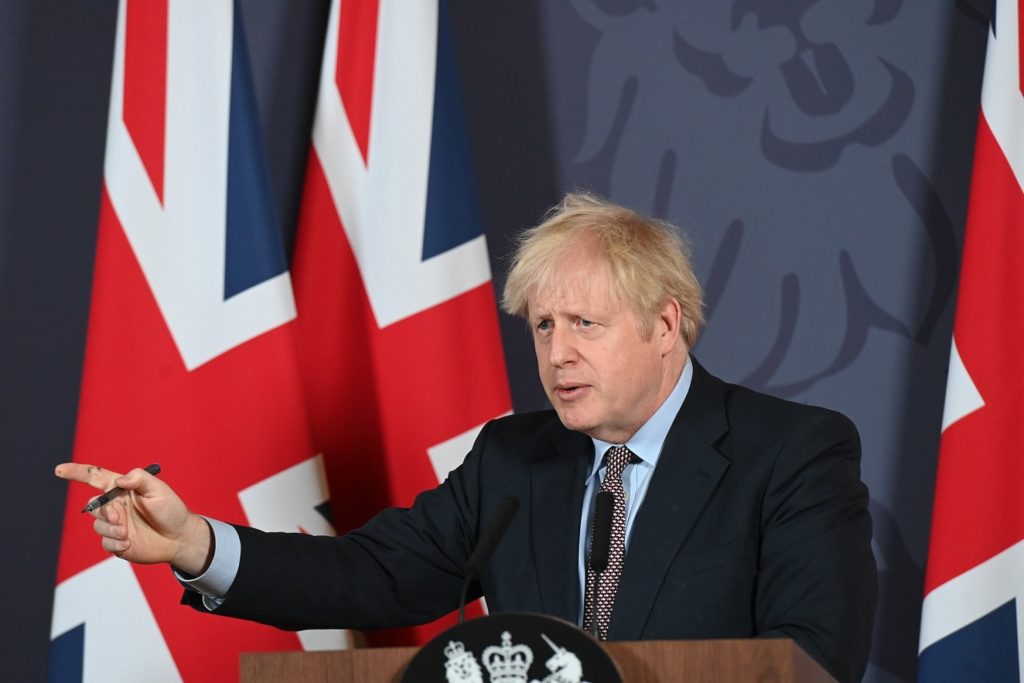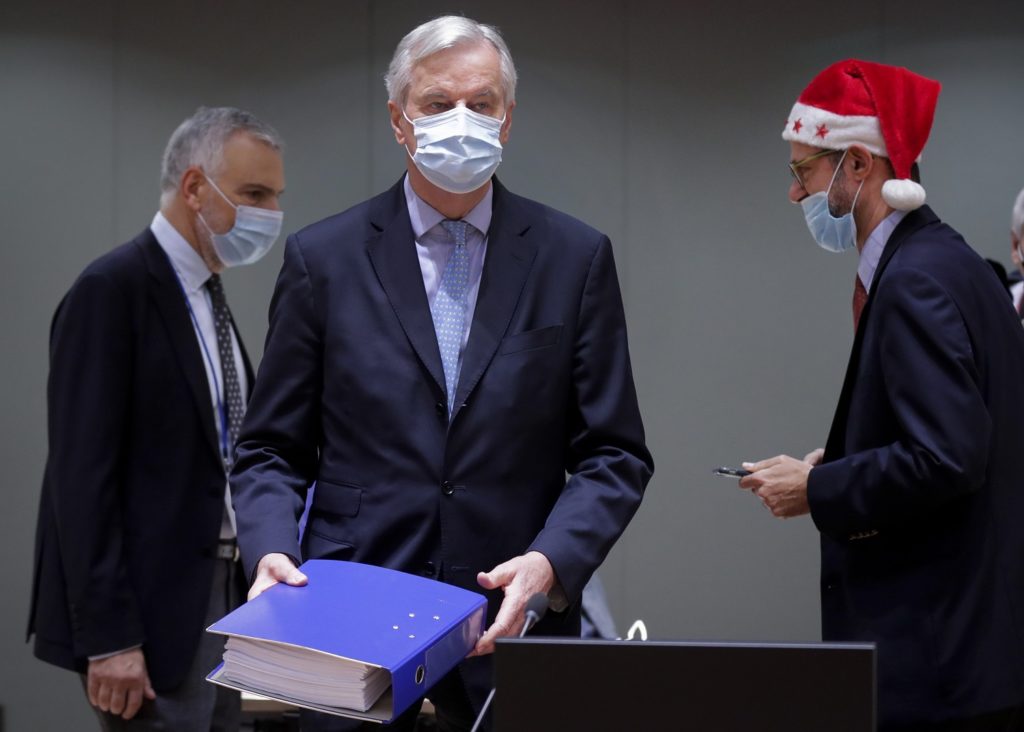The deal Boris Johnson brought back from Brussels should be a prized moment of triumph for Brexit’s hardline political leaders. The war is won. No free movement, or single market, or customs union. Britain out of even the most harmless European programmes or regulators, like Erasmus or the European Aviation Safety Authority. Everything settled. Total victory.
So it’s interesting that the deal isn’t really the end of something at all. It is the start of it. It is the creation of a forum for further conversations, in which Britain can either pull further away from Europe or walk closer towards it. But all the dynamics we see – in terms of the structure of the agreement, the economic repercussions and the likely political motivations of future governments – point towards reintegration with Europe. The document is a testament to Brexit’s victory. But it contains within it the flaws which will undermine and perhaps even reverse it as a project.
The central accomplishment of the deal is to secure zero tariffs. That’s what both sides wanted and it’s what they got. This shouldn’t be brushed aside. If it were not the case, parts of manufacturing and most of farming would become unprofitable overnight.



But elsewhere, the deal is really quite strikingly poor, even by the standards the government set itself. The British team hoped that professional qualifications on both sides would be mutually recognised. They failed. They hoped to secure an equivalence agreement on sanitary and phytosanitary (SPS) measures and reduce the hassle of checks on agricultural goods, like the EU offered New Zealand and Japan. They failed. They tried to secure mutual recognition of conformity assessments so that domestic bodies could certify goods for the EU market, like the EU offered Canada and the US. They failed.
But then, it’s possible the government never really cared about these issues, or that it didn’t have the capacity to pursue them given the tight timeframe and covid. So it’s worth looking instead at two areas they really did care about: the level playing field and fishing.
Level playing field
The level playing field involves policy areas like labour rights, the environment and state aid – where a government subsidises a sector in a way that disadvantages its competitors.
The EU’s opening position was that the UK align dynamically with its law on state aid under European Court of Justice jurisdiction. Over the summer, it gave up on that and instead demanded a domestic state aid enforcement programme from the UK, which would lead to arbitration in the case of a breach, and tariffs if one side was found to have broken their word. And after a lot of screaming and shouting and needless fuss, that was basically what they got.
Each side has to maintain a body to oversee its subsidy control regime and a court or tribunal to try subsidy cases. If a subsidy breaches the agreement, the court can order it to be recouped. If a dispute over subsidies is not solved by consultation between the EU and UK, each party can resort to “remedial measures”. There is arbitration before the counter-measures are imposed and possibly afterwards, if one party says they are disproportionate. If they find there was a breach, it can authorise a suspension of parts of the trade agreement.
On labour standards and the environment, both sides committed to not lowering protections, with a right to proportionate counter-measures in the event of a breach with a material impact on trade or investment. Those counter-measures will be subject to review by an arbitration tribunal.
But there is also an arrangement which sits above all these specific provisions. It is called “rebalancing”. This is not about maintaining present standards, it’s about what happens in the future. If either party decides that there have been “significant divergences” in the level playing field which are having a major impact on trade and investment, they can impose “rebalancing measures” in the form of tariffs.
After four years, if one side decides there have been too many breaches, they can trigger a review of that whole part of the trade agreement, leading to a potential suspension of the whole thing and other linked aspects, like transport. Basically, the threat of no-deal hasn’t gone away, even now. It can still be imposed after a few years if the two sides diverge.
Fishing
The results on fishing follow a similar pattern. The opening EU position was that Britain should maintain the position it had in the EU. This involves a complex interplay of arrangements. Basically, the stock of fish species are divided up between countries in set quotas, which do not change. Then each year scientists provide advice on a total allowable catch.
Britain’s position was that it was now an independent coastal state and it would decide what went on in its waters. Essentially it wanted to turn into Norway, which gets together with the EU every year to sort out the quota. If no agreement is reached, Norway can tell them they can’t fish in their waters.

Legally, Britain’s position was completely sound. But it had a problem with leverage. Britain does not eat its own fish – 80% of what it catches goes to the EU. So if the UK refused to play ball, the EU would simply apply the tariffs on fish, which are very high, and make the sector unprofitable. You could catch all the fish you want, you just couldn’t sell them.
Many experts thought the UK would fail to get the EU to re-open the tortured quota question, but in fact it secured a 25% increase in the value of the EU catch in UK waters. Less than it wanted, but a decent result. There’ll be an adjustment period of five and a half years. This new quota then becomes the baseline for 2026. Like Norway, annual negotiations will decide access.
But an interesting thing happens if the UK tries to block or limit EU access to its waters. The EU can retaliate by limiting access to its waters, or, more damagingly, slapping tariffs on fish, or on other goods, or even by suspending other parts of the deal. Either side can terminate the arrangement, but if they do it automatically terminates the trade, aviation and road transport sections – basically the no-deal guillotine again.
Boris Johnson claimed that after the five and a half year adjustment period is over, Britain could catch “all the fish that it wants”. In fact, this is incorrect. The deal clearly suggests that after this period the quota will stay at the point of the initial reduction. Of course, the UK can close its waters if it wants to, but tariffs will go up.
This dynamic is very similar to the one experienced by countries like Norway in the EEA agreement. They technically have a way of vetoing European law. It’s called Article 102 – the ‘right of reservation’. Norway even came pretty close to using it over the Postal Services Directive. But if they did it, it would neutralise that whole part of the agreement. So they never do, because the consequences are too dire.
No closure
This is the great advantage the EU has. It is an advantage of size, but also of solidarity. The UK can’t pick countries off and sell the fish to one of them if tariffs go up with another. The tariffs are the same for all. This is what gives the EU its strength. It’s why the UK mostly capitulated. And it’s why the dynamic is likely to remain the same in future. After all, this is the most messianically pro-Brexit government we’re likely to see. If they didn’t take no-deal in the face of EU leverage, how likely is it that a future one will?
There is ultimately no closure here. We are going to see the same dynamic in future that we have witnessed over the last four years: constant talking and bickering, with the UK facing the reality of EU leverage.
The deal sets up a new institutional structure of a Joint Partnership Council – and you’d better get used to that name, you’ll be hearing it a lot over the next few years. It’ll be formed of over 30 sub-councils, each focusing on a specific area of the agreement. What was once done in the Council and Commission will be done through a vast array of specialised committees and working groups. As time goes on, more of these committees will emerge, on things like financial services, as they become added to the framework of the agreement.
Every five years, the UK and EU will review the agreement, supplementary agreements and any matters related to it. That corresponds to the standard five-year political timetable in Brussels and Westminster. In other words, each new Westminster parliament, or Council president, or European parliament, is going to have their own Brexit, their own appraisal of the relationship.
This is a pulsating, living deal. The metaphor of a divorce no longer really holds. It’s like a couple splitting up but then buying a new much smaller home where they’ll meet up at weekends. Maybe they’ll be sickened by each other whenever they arrive. Maybe they’ll start to remember what they saw in each other in the first place. Divergence or integration.
For the next couple of years, Johnson will try to prove the benefits of the former. But in the medium-to-long-term, the good money is on the latter. Future Labour governments will seek closer ties on security, trade and smaller items like Erasmus. More pro-business Tory administrations without the current ERG baggage may well pursue the same. Business will lobby constantly for the UK to avoid regulatory divergence because it will increase the cost of exports to Europe. And most importantly, the EU has very broad powers in the agreement to punish divergence. It can suspend parts of the agreement, or simply apply tariffs.
So structurally, economically and politically, the winds blow in the direction of integration. It’s not conspiracy or magic; it’s just that people trade most with places that are close and big. And when they trade, they want less friction. Brexit has done many shocking things, but it cannot negate the objective reality of geography or trade flows.
Even in the moment of Brexit’s triumph, it carries the seeds of its own failure.
Ian Dunt is editor-at-large for Politics.co.uk. His new book, How To Be A Liberal, is out now.











